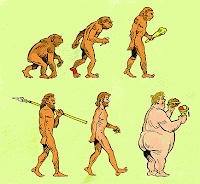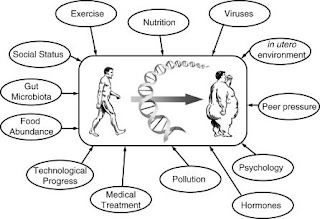 |
| Michael Skinner. Not Mule Skinner. Pay attention. |
I just found another bit on evolution and epigenetics from Michael Skinner in Aeon.co, who's getting to be my fave. My BSF. That's Best Scientist Forever.
The link is at the end.
And here're the best bits:
Charles Darwin’s theory of evolution, the process of natural selection by which nature selects the fittest, best-adapted organisms to reproduce, multiply and survive.
The process is also called adaptation, and traits most likely to help an individual survive are considered adaptive. As organisms change and new variants thrive, species emerge and evolve.
But this explanation for evolution turns out to be incomplete, suggesting that other molecular mechanisms also play a role in how species evolve.
Part of the explanation can be found in some concepts that Jean-Baptiste Lamarck proposed 50 years before Darwin published his work. Lamarck’s theory, long relegated to the dustbin of science, held, among other things, ‘that the environment can directly alter traits, which are then inherited by generations to come’.
Lamarck, a professor of invertebrate zoology at the National Museum of Natural History in Paris, studied many organisms including insects and worms in the late 18th and early 19th centuries. He introduced the words ‘biology’ and ‘invertebrate’ into the scientific lexicon, and wrote books on biology, invertebrates and evolution. Despite this significant academic career, Lamarck antagonised many of his contemporaries and 200 years of scientists with his blasphemous evolutionary ideas.
At the start, Lamarck might have been pilloried as a religious
heretic, but in modern times, it is the orthodoxy of science – and especially Darwin’s untouchable theory of evolution – that has caused his name to be treated as a joke. Yet by the end of his career, Darwin himself had come around; even without the benefit of molecular biology, he could see that random changes were not fast enough to support his theory in full.
(Here) is the precise definition of epigenetics: the molecular factors that regulate how DNA functions and what genes are turned on or off, independent of the DNA sequence itself. Epigenetics involves a number of molecular processes that can dramatically influence the activity of the genome without altering the sequence of DNA in the genes themselves.
Environmentally induced epigenetic transgenerational inheritance
has now been observed in plants, insects, fish, birds, rodents, pigs and humans. The epigenetic transgenerational inheritance of phenotypic trait variation and disease has been shown to occur across a span of at least 10 generations in most organisms, with the most extensive studies done in plants for hundreds of generations.
One example in plants, a heat-induced flowering trait first observed by Carl Linnaeus in the 18th century, was later found to be due to a DNA methylation modification that occurred in the initial plant, and has been maintained for 100 generations.
In worms, traits altered by changes in nutrition have been shown to
propagate over 50 generations. In mammals with longer generation times, we have found toxicant-induced abnormal traits propagated for nearly 10 generations. In most of these studies, the transgenerational traits do not degenerate but continue.
Much as Lamarck suggested, changes in the environment literally alter our biology. And even in the absence of continued exposure, the altered biology, expressed as traits or in the form of disease, is transmitted from one generation to the next.
Here's what evolutionary folks did. They used Randomness in evolution to get rid of the need for God.
Here's what religious folks did. They missed that entirely mostly and decided that the earth and the universe were only 6000 or so years old and everything happened instantaneously, more or less, spread out over six days.
Here's where we get to meet in the middle. Evolution is a thing, but
it is not a random thing. Things self-organize to solve problems of survival with intent and specificity. It's an intelligent process of reacting to the environment quickly and deliberately, not over long periods of time gradually and randomly.
It happens in ONE generation. And can persist for A HUNDRED generations.
Not gradually over long periods of time. Not randomly in any sense.
it is not a random thing. Things self-organize to solve problems of survival with intent and specificity. It's an intelligent process of reacting to the environment quickly and deliberately, not over long periods of time gradually and randomly.
It happens in ONE generation. And can persist for A HUNDRED generations.
Not gradually over long periods of time. Not randomly in any sense.
So since Randomness has gone away,
God is back.
You should go read it right now.
Now. You might be saying, what a minute! Just because Randomness is gone doesn't mean God is back! WTH!
Well. Yes, it does. If they used Randomness to get rid of the need for God, then logically if Randomness is no longer Randomness, then it's pretty reasonable to say that God is needed. That's just logic.
But. Maybe you need a bit more than that. OK.
Evolution as a theory doesn't get rid of God. Just like the good ol'
laws of nature, if the universe has a starting point, then the question, where do the laws come from, has as a possible and reasonable answer, God made the laws.
It's not the only reasonable answer, but, well, there are no other answers to the question, so you've got that or nothing.
You could then say, well, that's just God-of-the-Gaps all over again. Don't know the answer, so just blame it on God.
The problem with that is that God-of-the-Gaps is an inside-the-universe thing. Not an outside-the-universe thing.
Everything inside the universe can be explained (eventually probably) by the laws of physics.
But the laws of physics only exist inside the universe. Including, as far as we know, evolution. Which is really a process more than a law.
The universe produced the laws of physics, and evolution is
apparently derived from those, and all of that happened because of Big Bang creating the universe itself, and so we have no laws to cause Big Bang and we've no real idea at all why there are laws and particles and forces and all of that. Why there is something rather than nothing, that is.
The laws of physics are intelligent and ordered and extraordinarily calibrated to the finest of fine-tunings, and if there is only one universe (which is all we will ever ever ever have evidence for), then, well, somebody smart set it all up. Even if there are many universes, there still could be somebody smart out there in the Nothing setting it all up.
And an evolutionary process that is non-random is clearly the product of a smart somebody out there somewhere.
For lack of a better word, we'll call that God.
So here's what we're saying. If things happen in life, the universe
and everything (Nice phrase, that. I should remember it.) with clear and unmistakeable signs of an intelligence, one that empowered the universe with the laws of physics and with the amazing power of epigenetically driven evolution driving things so that intelligent observers would arrive in the universe and cause REALITY ITSELF to come into being, then, well,
that intelligence, that organizing observing intelligence outside of time and space that observed the universe into being and imbued it with organizing laws and rules so that
first there was the language of the universe (mathematics) and second there was physics and third there was physical chemistry (inside of stars) and fourth there was then chemistry (the table of elements) and fifth there was biochemistry (life itself) and sixth there were eventually observers and seventh there was Reality, then
you don't have to call it the God of Christianity or Judaism or Islam or the gods of Hinduism or the pantheonic gods of Rome or Greece,
but whatever. It's a lot like whatever God would be if God were.
And what we've already seen in previous posts is that the universe is apparently defined by
Interactions. Relata. Relationships.
Which means that this God is likely to be an interactional,
relational God, and thus it is entirely reasonable to suggest that this God
is all about relationships.
Perhaps even and especially
with us.
Dang. That's some sweet logic.
Now. You might be saying, what a minute! Just because Randomness is gone doesn't mean God is back! WTH!
Well. Yes, it does. If they used Randomness to get rid of the need for God, then logically if Randomness is no longer Randomness, then it's pretty reasonable to say that God is needed. That's just logic.
But. Maybe you need a bit more than that. OK.
Evolution as a theory doesn't get rid of God. Just like the good ol'
laws of nature, if the universe has a starting point, then the question, where do the laws come from, has as a possible and reasonable answer, God made the laws.
It's not the only reasonable answer, but, well, there are no other answers to the question, so you've got that or nothing.
You could then say, well, that's just God-of-the-Gaps all over again. Don't know the answer, so just blame it on God.
The problem with that is that God-of-the-Gaps is an inside-the-universe thing. Not an outside-the-universe thing.
Everything inside the universe can be explained (eventually probably) by the laws of physics.
But the laws of physics only exist inside the universe. Including, as far as we know, evolution. Which is really a process more than a law.
The universe produced the laws of physics, and evolution is
apparently derived from those, and all of that happened because of Big Bang creating the universe itself, and so we have no laws to cause Big Bang and we've no real idea at all why there are laws and particles and forces and all of that. Why there is something rather than nothing, that is.
The laws of physics are intelligent and ordered and extraordinarily calibrated to the finest of fine-tunings, and if there is only one universe (which is all we will ever ever ever have evidence for), then, well, somebody smart set it all up. Even if there are many universes, there still could be somebody smart out there in the Nothing setting it all up.
And an evolutionary process that is non-random is clearly the product of a smart somebody out there somewhere.
For lack of a better word, we'll call that God.
So here's what we're saying. If things happen in life, the universe
and everything (Nice phrase, that. I should remember it.) with clear and unmistakeable signs of an intelligence, one that empowered the universe with the laws of physics and with the amazing power of epigenetically driven evolution driving things so that intelligent observers would arrive in the universe and cause REALITY ITSELF to come into being, then, well,
that intelligence, that organizing observing intelligence outside of time and space that observed the universe into being and imbued it with organizing laws and rules so that
first there was the language of the universe (mathematics) and second there was physics and third there was physical chemistry (inside of stars) and fourth there was then chemistry (the table of elements) and fifth there was biochemistry (life itself) and sixth there were eventually observers and seventh there was Reality, then
you don't have to call it the God of Christianity or Judaism or Islam or the gods of Hinduism or the pantheonic gods of Rome or Greece,
but whatever. It's a lot like whatever God would be if God were.
And what we've already seen in previous posts is that the universe is apparently defined by
Interactions. Relata. Relationships.
Which means that this God is likely to be an interactional,
relational God, and thus it is entirely reasonable to suggest that this God
is all about relationships.
Perhaps even and especially
with us.
Dang. That's some sweet logic.














































